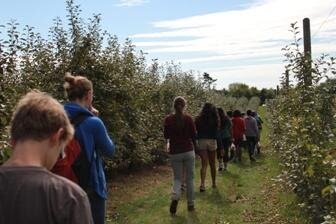EcoSpark Blog
Phragmites Researcher Interview: Lynn Short
Lynn Short is a Professor and Researcher at Humber College in Horticulture. She is also the owner of a cottage in Tiny Township on Georgian Bay, where she developed an innovative technique to remove invasive Phragmites (common reed) without herbicides.
What’s black and yellow and needs your help as a citizen scientist?
Kudos to you if you guessed bumble bees. It’s sad but it’s true that this genus of key pollinator is in danger due to human activities such as pesticide use, climate change, and habitat fragmentation.
Happy International Youth Day from the Greenbelt!
Every year, International Youth Day takes place on August 12. This day was declared by the United Nations General Assembly on December 17, 1999 to promote the empowerment and inclusion of youth. Today, youth make up 1.8 billion people on the planet – the largest in history!
Feet First: Students Plunge in Evaluating their Local Streams
I had just looked up from the bug cupped in the hands of one eager student when I saw something that immediately brought a smile to my face. Another young girl who, unlike most of the other students, was not wearing rubber boots had decided to join her classmates in the water despite having only running shoes.
Milliken Students Take a Stand: The Mission, Protect the Water and Ecology in Markham
This blog was contributed by Milliken Mills students Shamar Brown and Thuvarakan Jeyasanthan. These students were inspired by the Changing Currents program to take action in protecting their local environments.
How to Grow Sustainably: Building complete communities with classrooms in Burlington
Happy Geography Awareness Week! As an Education Consultant with EcoSpark, I deliver workshops to teachers and students about how to build sustainable communities. As a former teacher and someone who is passionate about protecting our environment, I really enjoy speaking about how we can build our communities to help protect green spaces, reduce climate change, and accommodate a growing population.
Happy World Planning Day!
World Town Planning Day takes place annually on November 8th and is an international day celebrating the importance and great contributions of planners in their communities whether they are urban or rural. According to Statistics Canada, about 86% of the population lived in urban areas while 14% in rural communities in 2011.
From Creepy to Cute: How Stream Assessment Changed my View on Insects
A few days ago, I went with EcoSpark to a small stream in Unionville called Bruce Creek, which I hadn’t known was even there, to do stream assessments with people from my school - Milliken Mills High School.
Take Your Students Outside Today!
Outdoor Classroom Day is a global campaign that encourages the integration of outdoor learning and play. Every year, schools around the world take part in outdoor lessons and prioritizing outdoor play.
Sparking Science through Mentorship
In celebration of Science Literacy Week (#SciLit17), we’re organizing a Sparking Science Through Mentorship Conference on Thursday, September 21!
Happy World Monitoring Day!
Happy World Water Monitoring Day! World Water Monitoring Day takes place each year on September 18. Every year, the World Water Monitoring Challenge, now known as the EarthEcho Water Challenge, seeks to build public awareness and encourage involvement in protecting water resources.
Happy World Turtle Day!
Ontario is home to seven different species of turtle, all of which are species at risk. Click to find out what “species at risk” means!
School Ground Stewardship with EcoSpark
EcoSpark’s flagship river study program, Changing Currents, does a fantastic job of bringing students into their local waterways through citizen science. Many of our schools visit and monitor the same sites every year for water quality and develop a connection to the nature there.
Running with the Rot Squad in Headwater Streams
I’m an aquatic/landscape ecology PhD student from the University of British Columbia. I’ve been working with EcoSpark since last summer to develop a citizen science protocol to examine how an ecological process, decomposition rate of cotton strips in headwater streams, might change when land uses in watersheds are different.
EcoSpark in the Park - Connecting community, citizen science and fun in nature
On a sunny September day, my nine year old son and I headed down to the Humber River for EcoSpark in the Park. Tom immediately volunteered to put on a pair of waders and hop into the river, a place he had been told not to go on previous school trips and family visits to the park.
Angela’s Greenbelt Blog: My Greenbelt Youth Charter Experience
When I heard about the opportunity to be a part of the first-ever Greenbelt Youth Charter, I immediately signed up. Mother Nature does not have a voice but I do—we all do!
Angela’s Greenbelt Blog: The Greenbelt’s Diversity
EcoSpark’s Greenbelt Youth Charter Bus Tour enabled me to see beyond what I was familiar with and I learned so much through this experience.
Angela’s Greenbelt Blog: A Gem Outside the City
In less than an hour’s drive from the heart of downtown Toronto, you will arrive at the Greenbelt. This piece of undeveloped green land is the world’s largest protected greenbelt and is a place where many people escape to relax.


















